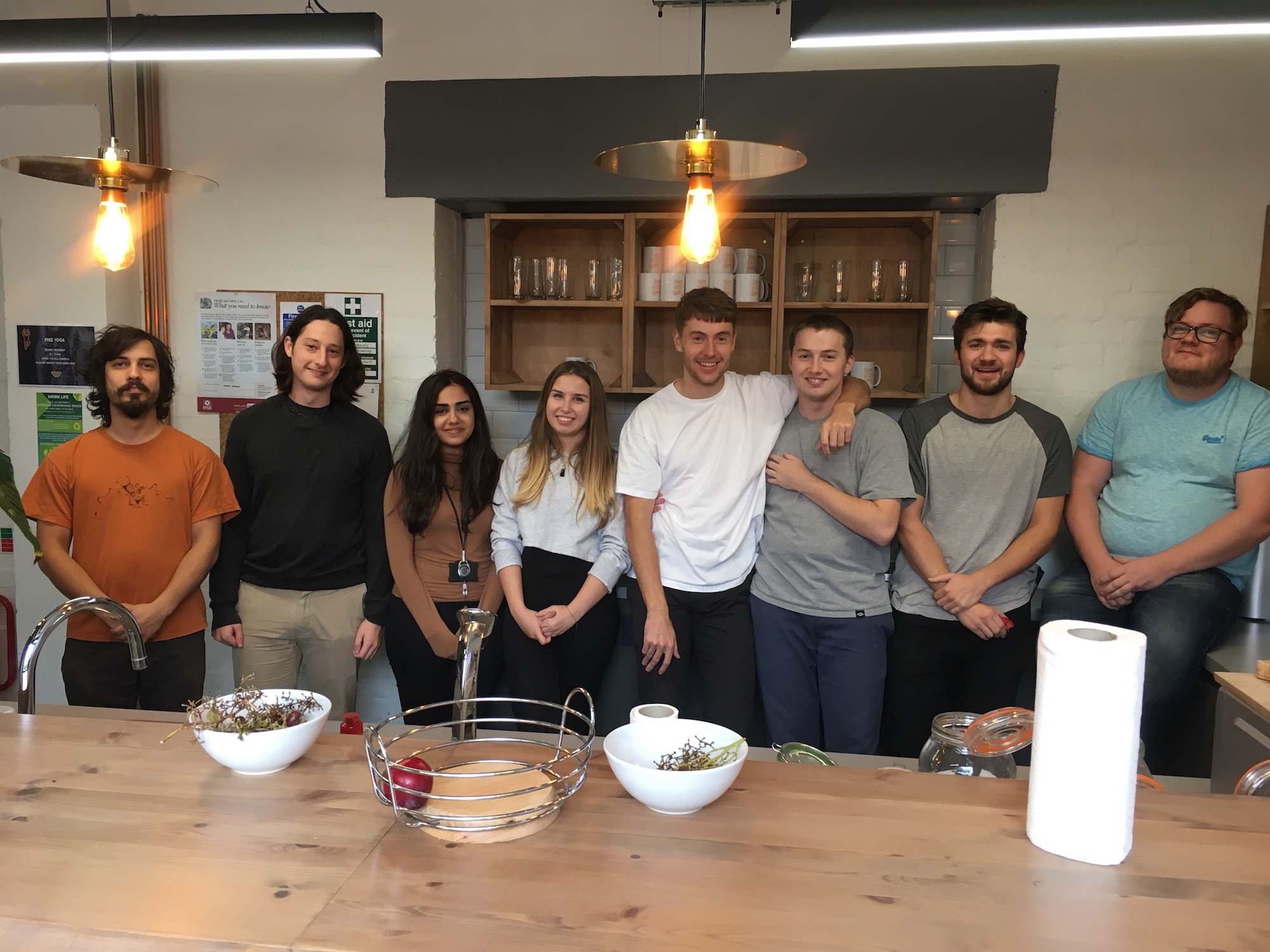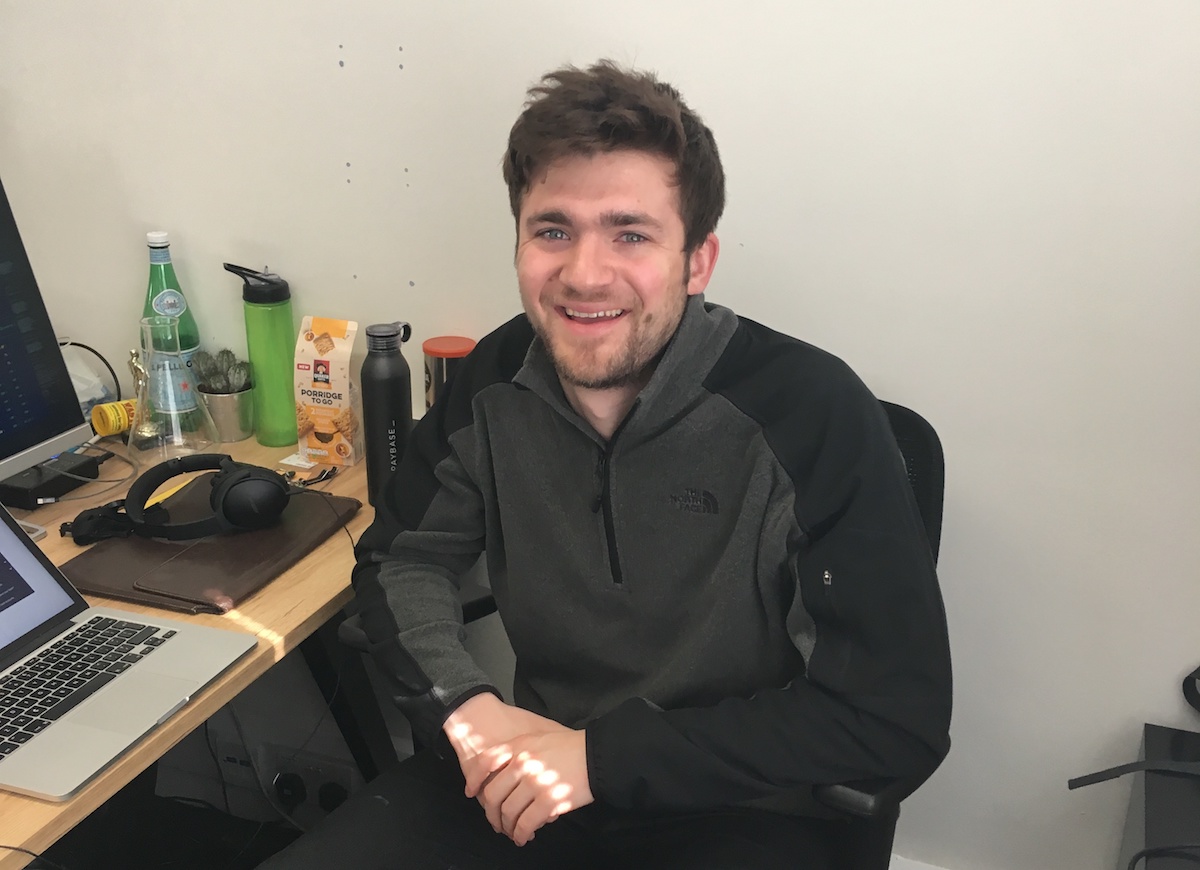How do coders become coders?
Oct 10, 2017, by Dan Whale

Tech
Coding
Paybase Culture
We asked our Software Engineers where it all began, as well as some other things.
To get a job in the skilled labour market, you are usually required to follow a pretty set path. You don’t become a footballer after starting out as an accountant. That being said I don’t imagine there are many accountants that began their careers as footballers. Some jobs just need a large amount of training or specific high-level education.
But ‘developer’, whilst being a highly skilled, highly talented and very much in-demand job, does not fall into this category. In fact, there seems to be a different origin story for pretty much every developer you ask. Our software engineers were kind enough to tell us how they got there.
Joel – Software Engineer
So how did it all start for you Joel?
Well, I’m from a technical family. My mum worked for Microsoft and my dad’s company was linked to Microsoft as well, but I guess the first bit of programming I remember doing was just tinkering with websites at around 11 or 12. Then MySpace came out of course.
Ah so it’s in your blood Joel?
Perhaps! As a family we used to talk about apps that should exist but don’t, so after an unenjoyable chemistry degree I decided I would learn how to make them. I took a 3 months intensive course on web development at General Assembly. The course was designed to get you proficient in building a full stack application, using Ruby on Rails. I really enjoyed it and I knew from the course that I wanted to do this as my job.
And luckily Paybase came along.
Yeah, over 2 years ago now. I started out doing a lot of JavaScript, which I’d only done a bit of before. I learnt a lot about Meteor, then from there moved on to touch all parts of the system by using a bit of Ruby on backend stuff and doing some more DevOps tasks with Kubernetes. As the system progressed and we’ve brought on new technology I’ve always tried to have some sort of input. That’s what I really value about working here, if you want to have a go at something you haven’t done before, you can. The support is there.
Good stuff! Any interesting bits of code you’ve done?
I have a bit of code which alerts me when tickets go on resale on Resident Advisor. It’s pretty useful, in fact my friends are now constantly asking me to sort them with tickets.
Sounds like you did a good job there then Joel! Thanks!
Ana – Systems Engineer
Ana! Where did you code journey begin?
In Romania you study it at school. Even my secondary school offered it (though not all do) so I was about 12 when I started. But it was considered a ‘boy’s thing’ and I didn’t have a computer at home, so I didn’t get much support in those days.
Wow, what kind of things were you doing?
Basic stuff, how to write HTML and C++. I carried it on through high school and ended up coming to the UK to study Computer Hardware and Software Engineering at university. There it was a mixture of Electrical Engineering and Signal Processing. I did a bit of C and a bit of Java, it was more around hardware and building stuff than software.
Aha, someone who studied it at university! How was it?
Not great we both laugh. I didn’t really like the uni but my placement year at IBM allowed me to explore new things. Due to a mix-up with the candidate selection I was actually given a business role, then at the end of the year I managed to get myself a technical internship.
Good going! And you learnt lots of code there?
Yeah, I’ve mainly learnt code through my work. When I went into DevOps I was pushed into Cloud Services and needed to pick things up really quickly, but it was good. Now I’m at Paybase and am really enjoying my work.
Great, any side projects?
A few but they’re just things that help me with my job really, I just like learning things the hard way.
Why’s that?
It’s how I was brought up. I always tried to do the hardest things at school because, if anyone else could do it then so could I. That’s the best bit of advice I could give if you want to get into coding. Don’t compare yourself to anyone else, just try it, and don’t give up!
Wise words Ana!
Michael – Software Engineer
So Michael, what was your first interaction with code?
When I was younger I worked at a graphic design studio that specialised in print. One client asked us to update their website and my boss told me to use Dreamweaver. Soon after that they asked us to redo their entire site and my boss didn’t really know what to do. I ended up googling lots of Stack Overflow and copying and pasting a load of jQuery. We got there.
And after the studio?
When I moved to London I was googling code by day and working in a pub by night. A friend knew some art people so I was doing portfolios and things like that, some paid, some not. By chance a friend of mine was working at a coding company and there was a job going. At that point I had a pretty decent grasp of frontend development and was offered the job!
That company was Payfriendz, which then became Paybase. So you’ve been here…?
A year and 4 months now. Being surrounded by really good developers means my code has come on leaps and bounds. When I started I was using the React Native framework and am currently involved with the backend of the platform using Node.js.
Cool, is there any code you’ve written which is particularly interesting?
A few years ago I made a Kanye West weather vane based on what people were saying about him on Twitter, and then used sentiment analysis to forecast how positive it was.
Fantastic. Does it work?
Not amazingly well. I spent too much time on the visuals.
Balazs – Software Engineer
Balazs, when did your code journey begin?
I guess I was around 12 or 13. I was making games using Gamemaker. It was really simple as it was a lot of UI as opposed to code. Crafted behaviour for elements, stuff like that.
And from there you were hooked?
I did bits and pieces at school but to be honest I fell out of interest with it for a while. It was when I was 22 that I had an idea for this music application, so to make it a reality I decided to teach myself how to code. I did some research on good programming languages and found Python. Annoyingly it was completely the wrong tool for my project but it did reignite my interest in programming.
And this was still all in your own time?
No, I was doing some menial IT jobs. Then came my shameful period - doing Java I get a cheeky smile from Balazs. It’s just what they were using at the company I was working for. Then I started working on this project tracking app which really got me into JavaScript and thinking ‘yep, this is definitely what I want to do’.
So that was a big milestone in your coding journey?
I guess so, but the whole thing is ongoing. Especially as JavaScript moves so fast - you always need to keep on top of it. As a discipline, programming is so huge and interconnected with everything, you can go as deep down the rabbit hole as you want.
Interesting. Is there any code you’ve done that you particularly like?
Hmmm, when I had been coding for about 2 years I thought I could build my own physics engine for a platform game. That was not the case. However I did make an Easter Egg on a popular fashion website where pressing certain keys invoked some strobe lighting and someone's head spinning around.
Hilarious, thanks Balazs!
Sam – Software Engineer
Sam, tell us how it all began.
MySpace!
MySpace?
Yeah! You could make your own HTML which did things like make snowflakes fall from the back of the screen. You could also copy from others and tinker with theirs - it was basically a process of seeing what could and couldn’t be tinkered with. It was similar with Windows, I probably changed the settings more than the average 14 year old.
So after all the tinkering what was your next big step up?
Well I did a Maths degree, so I learnt a lot about control flow. I was creating algorithms, doing more of the actual practices that are used in computing. Then during my masters I did a lot more coding - using Matlab with forays into Python and R.
And then you got a job in coding? Frontend or backend?
Well, not really. I went to Lloyds, but my knowledge was in scientific computing as opposed to anything related to front or backend. I was working with SAS which I was not a fan of, but within that I got to use SQL which I did like.
Then along came Paybase, or Payfriendz as it was then.
Yep! I was actually hired as a ‘Data Wiz’ and I was originally building Python scripts to automate analyses. I then built an analytical dashboard with Meteor as that’s what the team were using at the time - that was my first real introduction to frontend and backend. Having built that I got a taste for JavaScript and I’ve been part of the tech team ever since!
Great! What’s your most interesting bit of programming?
A ‘Spotipi’ bot. I forked and extended on a Spotify Client for Node.js to enable collaborative playlists within the office using Slack integration.
That is indeed an excellent addition to the office. Good job Sam.
Asma – Software Engineer
Asma, our new starter! Let’s start from the top if you will!
Well, my first bit of programming was trying to create this charity website to donate books to Zimbabwe. I was using Wix and came to realise I didn’t really know how the tech worked, but wanted to know more about making websites. Then, via Youtube, I came across Code Academy and took some courses in my spare time.
Oh wow! So this wasn’t something you studied?
No, I did a law degree! After that I was working at Lloyds Banking Group as a Business Analyst. I was interested in what the tech guys were doing but I couldn’t really get any exposure to it. The more coding I did on the side, the more I knew I wanted to get into web development.
So what was your next step?
I left Lloyds and went to Sparta Global for a 3 months intensive course on web development. Not long after I was here at Paybase!
You certainly seem to have a ‘go out and get it’ attitude.
Yeah! I remember seeing a Ted Talk which was all about how for a lot of people work just becomes habit, which means you’re not really living to your full potential. I really like law, but I wanted a career where I’d be constantly learning new things.
Great! Any interesting side projects you’ve worked on?
At Sparta Global I worked on an app for wedding planning/management. I’ve done my part but it’s a collaborative piece so it’s still in the pipeline!
Sounds useful, thanks Asma!
Tom – Software Engineer
Where did you first start with code then Tom?
After uni really! I studied Economics which is pretty mathsy, but when uni finished I had a few personal projects that I wanted to pursue - so I thought I’d learn how to code.
So all self-taught?
Yeah. I was working in a pretty uninspiring sales job at the time and decided to take some time off to learn how to get better at code. As well as my projects I did a few bits for friends and family - websites and things. I was mainly using inline PHP and some dodgy jQuery.
Nothing wrong with that if it helps you learn! When did you start working with code professionally?
I actually got a job at the Daily Mirror, doing the real backend of the backend. I was doing a lot with backend infrastructure and Node.js development. After gaining that skill set I joined Paybase!
And we’re happy to have you! What was the most interesting of the personal projects you mentioned?
Hmmm, bear with me here: an online massively multiplayer role-playing jackpot game.
Errrm...a what sorry?
Tom laughs It’s a game where you have to search the whole of the UK on Google Maps to find photographic clues to get jackpot prizes. Still working on that one!
Good luck to you Tom!
Chris – CTO
Now Chris, I get the feeling you’ve been playing with code for some time. When did you start?
Wow, I can’t honestly remember. I must have started with shell scripting when I was 7 or 8. It let me automate common tasks and it felt pretty cool interacting with the computer in a black window with a flashing prompt.
7 or 8?! You had an interest in code so young!
Well, it mainly stemmed from computer games. I loved playing them, but after a while I’d get really interested in the technology that enabled such fun experiences - especially networked games. Initially I started making games with Game Maker and GML (like Balazs), but I soon branched out into game server emulators.
How so?
I loved Warcraft 3 and I wrote a fork of PVPGN in C++, which was an open source emulator for Battle.net. I extended it with a leveling and matchmaking system for custom maps. I hosted it on a server in my bedroom. At its peak there were a few hundred players online which was quite a feat given it was hosted on a low-throughput ADSL connection.
Wow! Where did it all go from there?
As much as I enjoyed the gaming aspect, I was also interested in building business applications. I wrote a number of business intranet systems in ASP, and then PHP. I also wrote a few desktop applications in Python and later .NET. From there, I mostly built websites for small businesses. Mostly brochure-ware websites and eCommerce builds. I played with a lot of languages when I was younger, largely driven by wanting to peel back the layers and understand why different approaches where superior across different contexts.
Ah ok, so at this point you were working somewhere?
No, I was still at school, I was about 15. It wasn’t until 18 that I got my first job as a developer, where I mostly worked in PHP, deployed to manually provisioned Linux VMs with Apache and fastcgi. Wow, things have come far!
You have learnt so much about code over a long time, do you feel you’ve hit your major milestones or are you learning as much now as you ever were?
I'm always learning - and if I'm not, I'm dissatisfied. The same is true of the people we hire. Paybase derives a lot of it's market advantage through it's approach to technology. Instead of taking off the shelf solutions which might work okay, we'd rather push what’s state of the art and solve problems as best we can. But this requires constantly pushing oneself, it's not the easy way.
Interesting! Are there any particular projects you’ve worked on that stick out for you?
Hmm, I've got one. The Kubernetes project, and more generally container orchestration systems, have been one of biggest steps forward the industry has taken in many years in terms of stable, scalable and predictable deployments. In early 2014, I was with a friend in San Francisco and we were working on essentially the exact same thing. A few months later, Kubernetes launched!
Ah that must have been annoying!
No! No not at all! It was an incredibly mentally challenging project, and really forced me to think about all the problems Kubernetes was solving and how they could be solved. The project definitely extended my grasp of the problem. When Kubernetes came out we were just thinking ‘wow, this is great!’.
Good to know! Thanks for sharing Chris!
So it seems that to be a great coder, all you need to get started is an interest in programming, some research, and a love of learning. Once you’ve got that it won’t be long before you’re building your own celebrity weather vanes and online massively multiplayer role-playing jackpot games.
If you’re a developer interested in learning more about what what we’re doing at Paybase, please do get in touch!


